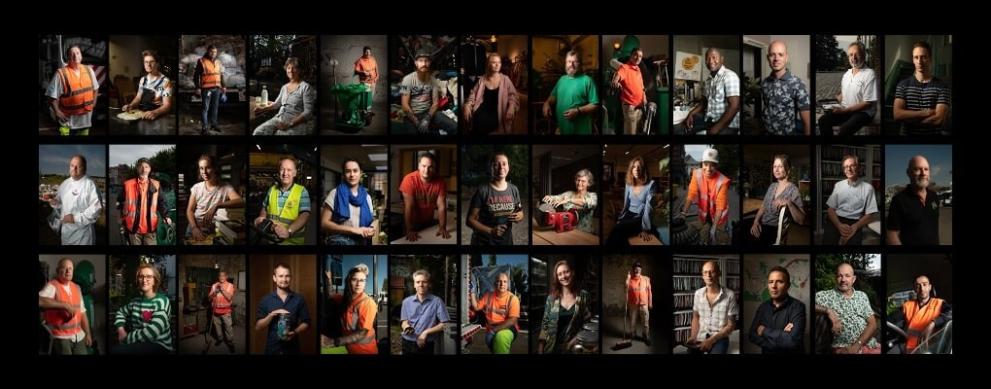How can we tell the history of waste without first understanding the situation today? How can we talk about waste without talking about the people who deal with it? How can you create an exhibition about rubbish without consulting the real experts? The communities in charge of waste management and reduction in Brussels opened their doors to us and shared their knowledge.
In 2020, the House of European History started to develop a temporary exhibition that looks at the issue of waste in Europe from a historical perspective. More than an exhibition, it would be a multi-faceted museum project, including a participatory approach that would allow for the inclusion of several voices — other than those of curators and historians — in the narrative that would be "Throwaway – The history of a modern crisis", the fifth temporary exhibition of the House of European History.
The desire to initiate a participatory approach appeared very early on in the development process: if this exhibition focuses on the most visible, most material, most palpable aspect of the environmental crisis (waste), it would be necessary to involve those who handle it! The research should be broadened beyond the archives and academic production to go into the field and talk to the real experts on waste: those who take care of the cleanliness of our city, those who avoid a lot of waste by repairing or reusing it, and those who practice "sobriety" and zero waste. Women and men, citizens, volunteers, committed professionals.
These individuals gave us their time and shared with us their knowledge, their memories and their thoughts. With them, we learned what cannot be learned from books.

And we were able to find these 52 experts because the organisations they work for, or volunteer with, agreed to open their doors to us. Our partners in this project were:
Bruxelles-Propreté
Bruxelles-Propreté is the regional agency of Brussels-Capital whose mission is to ensure that the city is healthier through its waste collection and treatment, cleaning and educational activities. The Agency has put the House of European History in contact with a number of officers responsible for door-to-door collection or cleaning and with the Research and Verbalisation service, which combats waste management offences.
Bruxelles Ville – Travaux de Voirie / Cellule Propreté Publique
The City of Brussels Public Hygiene Service is responsible for cleaning the roads, emptying public litter bins, removing illegal waste, cleaning out drains, maintaining urinals, public toilets and dog relief areas, and restoring public spaces during or after markets or other public events. The House of European History met the public cleaners who sweep and clean the streets of the City of Brussels, in their places of residence.
Les Petits Riens
Les Petits Riens has been at the forefront of the social and solidarity economy for 85 years. Its economic activity of collecting, sorting and selling second-hand goods, in addition to its positive environmental impact - gives new life to objects that might otherwise prematurely become waste! It also provides a platform for socio-professional integration for more than 500 people each year. Profits from sales in the shop help to finance social actions related to housing access, employment and daily support for the most vulnerable.
Repair Together
Repair Together was created in 2013, a few months after the opening of the very first Belgian Repair Café, in Ixelles, in 2012. Since then, the social, solidarity and environmental association has been supporting the creation of new citizen and local initiatives for greater reparability, sustainability and circularity. Repair Together helped the House of European History to meet volunteers active in various Repair Cafés in the Brussels area who, with their experience, give new life to objects that would otherwise be thrown away.
WORMS - Waste Organic Recycling & Management Solutions
The non-profit organisation WORMS promotes the recovery of organic waste in all its forms, on a human scale and in a localised manner, through their training and awareness-raising activities. WORMS asbl is an "activ'actor" of composting, by facilitating and catalysing the good practice of domestic composting in different environments (gardens, flats, parks, schools, catering etc.). The association is, among other things, mandated by Brussels Environment to supervise two networks of citizen composting in Brussels, namely the network of collective composts (200+ members in the Brussels region) and the network of Brussels Compost Guides (volunteer ambassadors who share their composting experience and with whom the House of European History has been in contact with).
Zero Waste Belgium
Zero Waste Belgium's mission is to raise awareness of waste issues and encourage zero waste and related practices. They support individuals and organisations moving towards zero waste, and report on trends from field experience, thus reinforcing the impacts of the zero waste movement on a large scale. The non-profit organisation is a member of the Zero Waste Europe network. Their permanent staff and some of their volunteers shared with the House of European History their values of citizen engagement, ecology and 'health sobriety'.
